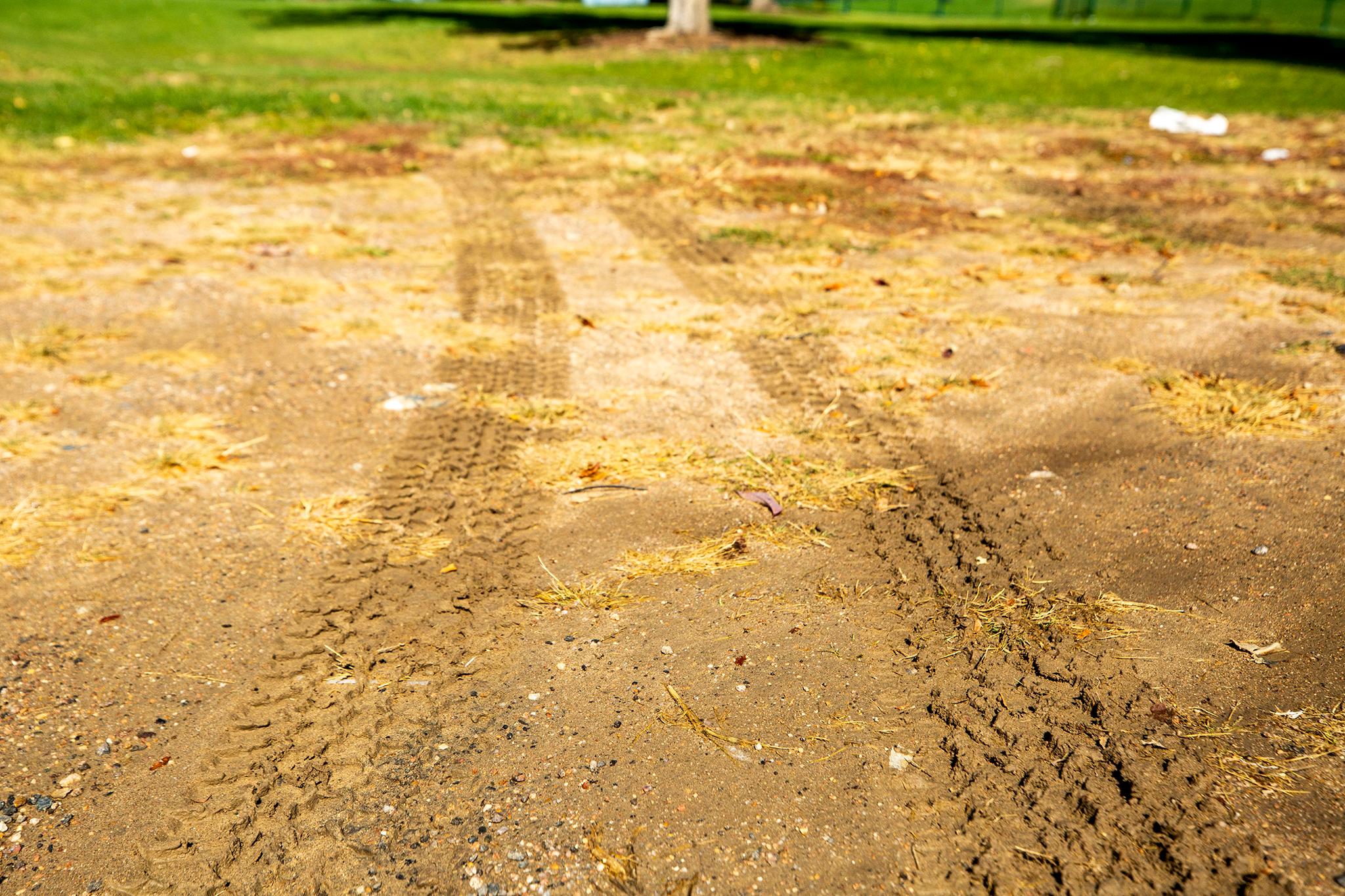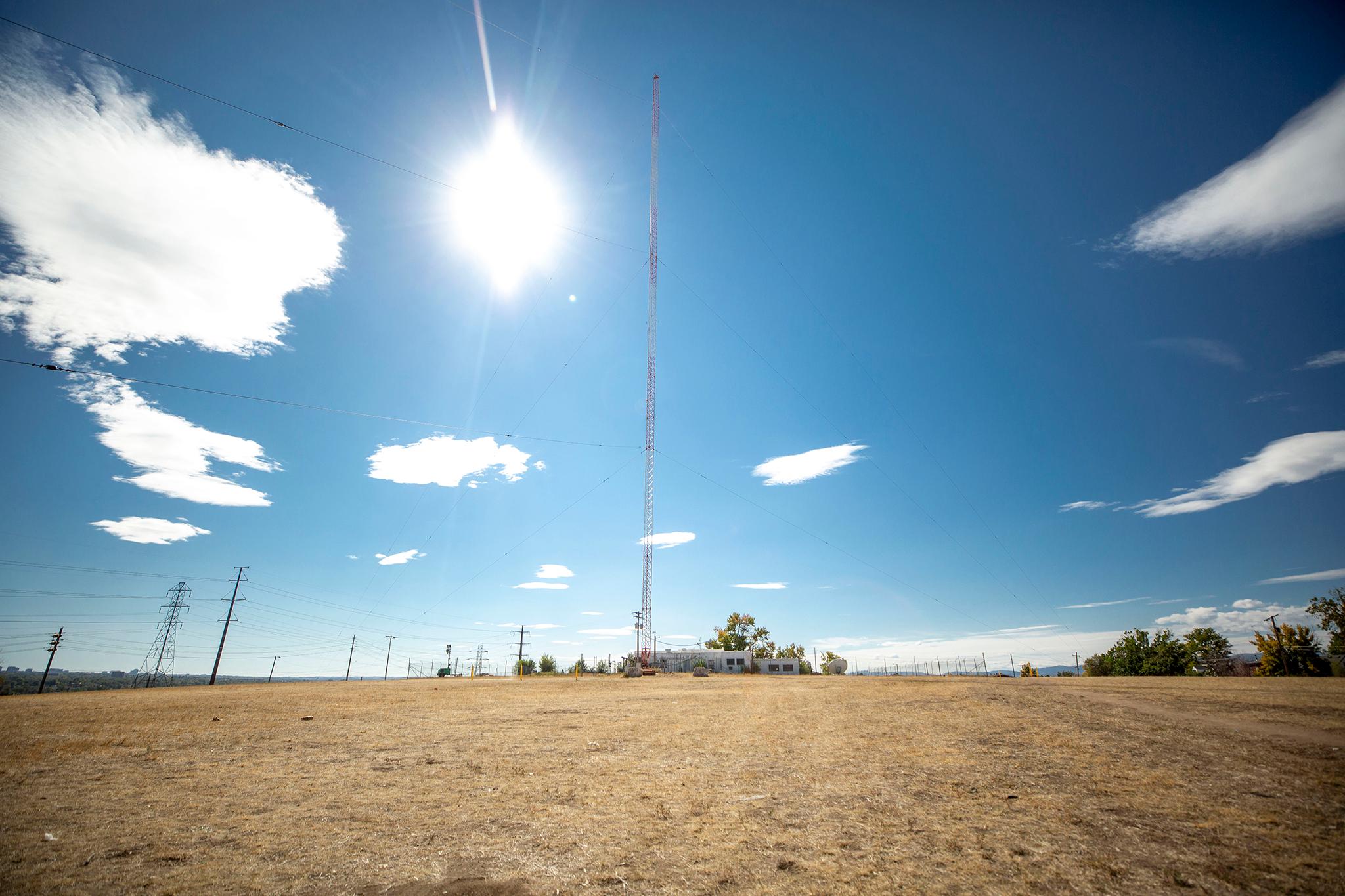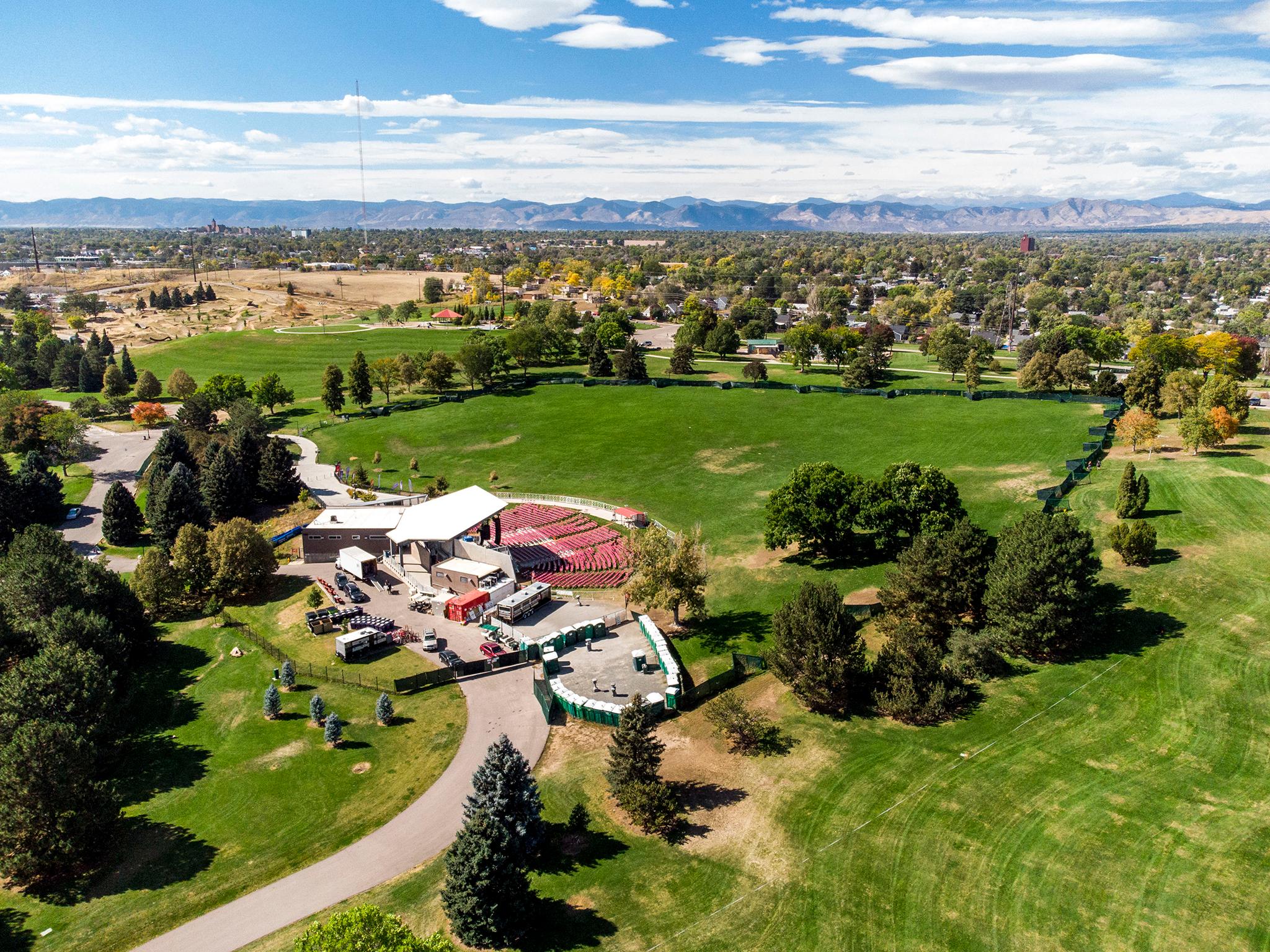Standing in her yard, Brandy Moe looks down at Ruby Hill Park, and she couldn't be happier.
People pour in from all over Denver for concerts at the massive four-year-old amphitheater, Levitt Pavilion. An older man, with a walker, ambles through a parking lot that has been shut off to traffic. Parents teach their children to ride their bikes in the empty lot; once they know how, they might join the daredevils zipping around the dirt mountain-bike course in warmer months. Skiers and sledders slide down the massive slope when it snows, kids play at the playground, and green thumbs from Moe's southwest Denver neighborhood tend the community garden, growing new friendships along with plants.
Things couldn't be more different than when she moved in just over a decade ago. Back then, she recalls, the park "was a place where people go to be naughty."
"In the 11 years that I've lived right next to the park, it has changed so much," says Moe, the co-president of the Ruby Hill Neighbors organization. "I remember the first summer I bought that house. Oh my goodness, there were kids just tagging all the trees in the park. And it was mind blowing. But now there are so many different ways to utilize that park in a positive manner, whether it be Levitt or the bike park. The community garden was built within the time I've lived here. There's so many reasons now for people to go to the park for positive use."
And over the past few years, people from around Denver have shown up in droves.
With all the growth in the park came worries from some neighbors. As a community leader, Moe's fielded her share of complaints.
Before Levitt Pavilion opened in 2017, many fretted about drunk concertgoers wandering the neighborhood or gobbling up parking spots. Others feared loud music would keep them awake. But the staff at Levitt Pavilion managed to largely ease neighbors' worries by showing up to community meetings and facing concerns directly.
Through the pandemic, park use has increased, Moe says. "During COVID, it was so neat to see the amount of people that began using Ruby Hill Park for all these different reasons."
But with the unexpected boom in park traffic, old issues resurfaced. A big one: parking.
Though most of the worries aren't from neighbors complaining about music fans blocking their driveways. Moe says she hasn't fielded one gripe in 2021. This time, the complaints have come from Denver Parks and Recreation, which fears that concertgoers parking on the grass could unearth Ruby Hill's toxic past.
Levitt Pavilion, says Parks and Recreation Deputy Manager Scott Gilmore, needs a better plan for the fans flooding in for shows. He's putting the pressure on the nonprofit rather than city government.
With so much life in the park, why fret about traffic?
The last thing Andy Thomas wants to talk about is parking at Levitt Pavilion.
As one of the venue's directors, he's helped throw hundreds of free shows and ticketed concerts with acts like John Legend, Thievery Corporation and Coheed & Cambria. The nonprofit has hosted many local artists and paid them fair rates, even when shows don't cost a cent. Over the past two seasons, the venue's survived a pandemic and, after going dark in 2020, pulled off its most successful season yet this year.
But, he admits, parking has been a worry.
The venue, which opens up to 7,500 fans for paid concerts and up to 20,000 for dozens of free shows a season, has seen faster growth than anybody predicted. Fans, coming out of pandemic shutdowns, have been flocking to wide-open Ruby Hill to enjoy live music and ample space for social distancing.
But massive crowds come with consequences: Between the regular park users and concertgoers, people don't have many places to leave their cars during popular shows. Nearby non-residential streets have shut down for construction; others have new bike lanes, limiting where people can park.
Riding public transit isn't an easy solution for fans either, says Thomas, and for pedestrians, scooter riders and bikers coming from the east, crossing Santa Fe doesn't feel safe.
The regional bike trail, which runs down the South Platte River, is a perfect path to the venue during the day, but the lack of lighting makes it harrowing to ride at night -- even with a headlamp and bike lights. While Lyft and Uber drivers are getting used to bringing people in, the roads through the park aren't intuitive and the ride-share drivers often find themselves tangled in traffic.
So fans are willing to risk a parking headache and drive themselves.
In 2021, particularly earlier in the season, many drivers, trying to snag a spot close to the venue, got creative (and unruly) and parked on the lawn. Sure, they risked being ticketed. But as Gilmore says: "People are like, 'It's a free concert. I don't have to pay anything. I'll pay a parking ticket if I have to.'"
For those aware of the park's history, tickets are the least of their concerns.

Staying off the grass at Ruby Hill Park is about more than just looks.
There's a good reason for drivers not to tear up the lawn -- and it's not a vain obsession with landscaping.
"The park is under a very strict management plan as it is built on a dump," says Gilmore. "It has pretty significant contamination underneath the park."
Records from the Environmental Protection Agency note that in the early 1900s, Ruby Hill was among 65 places in Denver that processed the radioactive element radium. After that, the area was a landfill.
In February of 1930, Ruby Hill hosted one of the city's largest bonfires, according to Brian Trembath, who works in the Western History Collection at the Denver Public Library. In 2019, he dug up this strange chapter in the park's past: The Denver Post and the Denver Automobile Dealers Association hosted a promotional event where 125 automobiles, soaked in kerosene, were torched. Traffic for that event was a disaster, as 30,000 cars caused a massive jam, bringing around 160,000 people to nearby Overland Park, to watch the spectacle.
For years, a brick company owned Ruby Hill. Back then, asbestos was used in bricks, says Gilmore. Underneath the park, the land is riddled with the dangerous element.
The City of Denver knows little about how Ruby Hill was transformed from a landfill into a park and has relied on three plans from the Denver Public Library archives to figure out the timeline: the first without a date, the second from 1955 and the third from 1971. Trembath writes that the park was formed sometime in the '50s.
The 1955 version of the plan was the first to include a possible amphitheater -- actually, two: one that would seat 25,000 and another that would seat 4,000.
The EPA eventually designated the area a Superfund site. Ruby Hill was part of what the federal agency dubbed Denver Radium, because of its radioactive history.
The agency led federal, state and private companies in a massive cleanup, according to EPA records from 1987. Some soil was excavated and taken off-site; other dirt was simply capped, with ventilation systems to release radon-gas buildup and avoid groundwater contamination. By 2006, the work was complete.
These days, "The park is 100 percent safe," says Gilmore...as long as the capped toxic stew isn't unearthed. Every time it is, Parks and Recreation has to report to the Denver Department of Public Heath and Environment and the Colorado Department of Public Health and Environment and have the disturbed area tested for asbestos and other contaminants.
Ruby Hill Park is hardly alone in being built on toxic land, Gilmore explains. Of the city's roughly 270 parks, around 80 are built on formerly contaminated sites.
For decades, the park -- one of Denver's largest -- was poorly used, except when weekend sporting events clogged the roads. Unlike City Park and Washington Park, Ruby Hill was often avoided: too much graffiti, too much crime.
Around 2003, the city started imagining what a brighter future for Ruby Hill Park could be. By 2008, Parks and Recreation had finished a masterplan, with consultation with the neighborhood. The plan acknowledged the park's horrible traffic problem, made worse by dangerous intersections, poor signage, narrow roads, and a lack of sidewalks that made accidents with pedestrians, forced to share streets with cars, likely.
So Parks and Recreation created 580 parking spaces at three new parking lots, designated parallel parking areas, and used no-parking signs to encourage police to ticket and tow cars breaking the rules. The plan warned that if drivers failed to stay in designated parking areas, fences might need to be installed to protect the soil from being disrupted.

Levitt Pavilion inherited limited infrastructure when it decided to launch in Ruby Hill Park.
When Levitt Pavilion, part of a national nonprofit network of venues, struck a deal with the city to build an amphitheater on the site, the organization had to offer a parking plan to the city. The initial hope was to contract with local businesses to open up their lots for parking and to encourage public transit and bike use. The businesses would benefit by being able to make money off of their lots that were empty at night; concertgoers wouldn't clog Ruby Hill Park's roads and bleed into the neighborhood, irking residents.
Most businesses didn't bite, so the team at Levitt Pavilion is still dreaming up a fix.
"Some of the pressure on us is to keep cars out of the neighborhood," says Thomas. "We haven't had very many complaints about it. Those are legal streets to park on. While it's free and legal to park there, we try to prevent people from parking there. We don't want cars parked all over the neighborhood."
When crowds slammed the venue in summer 2021 and drivers started chewing up the grass, the venue hired valets to help direct traffic and keep drivers in line and off the lawn, says Thomas. The venue struck a deal with Colorado Public Radio to rent out a lot the network (and Denverite's parent company) owned, which provided a few hundred spots, for a small fee, toward the top of the park.
"By next year we'll have a new parking plan in place that deals with this influx and the real life complications that happen at shows," says Thomas.
Those plans will likely include more bike racks, clearer directions for rideshare drivers, and more signage.
As the Ruby Hill Park masterplan enters its third stage, there are some rumblings among Levitt staff and people in the neighborhood about finding additional parking; after all, adding another lot at the top of Ruby Hill Park was part of the plan.
But neighbors, who weren't part of the original process, are begging the city not to build an additional lot at the top of the hill. "Every time you bring it up at the neighborhood meetings, the neighbors are like, 'Oh my God, please do not build another parking lot near the houses in Ruby Hill Park,'" Moe says.
That flat grassy area is one of the neighborhood's cherished treasures. People play volleyball and picnic in the grass. And even though most of the naughty behavior that once sullied Ruby Hill Park has ended, Moe says, people still occasionally shoot guns into the air and do donuts and burnouts in their cars at night -- all in the parking lots.
Another option some neighbors have been weighing would be building parking in a protected native-grass area below the hill, closer to the venue.
"It's just tall, yellow grass between Levitt and the railroad tracks," says Moe. "There's all kinds of room down there to build or to create more parking. And that makes more sense for Levitt. It makes more sense for the neighborhood."
But Gilmore shrugs off that proposal outright, saying that protecting open space -- particularly grasses that don't require water, which eats up his department's budget -- is a priority for Denver Parks and Recreation.

Denver Parks and Recreation wants concertgoers to imagine a solution.
Gilmore's not keen on adding any parking spaces to city parks and says music fans and Levitt need to figure out the fix.
"Levitt is required to come up with a parking plan and utilize what parking is in the area -- outside parking," Gilmore explains. "You've got Uber, Lyft, mass transit, a mass-transit station not far from there. You've got a regional trail next to the park."
As someone who lives in the neighborhood, Moe disagrees. The Evans Station is a 1.4 mile walk away. "If there was a bus that came anywhere near Ruby Hill Park, that'd be cool. But there isn't."
"Public transit is not great on the southwest side of town," says Thomas. "Transportation in general is tough in southwest Denver."
And neither the Ruby Hill neighbors, Parks and Recreation nor Levitt Pavilion can fix that alone. So the solution, for now, is left to the imagination of park users, concertgoers and whatever plan Levitt can drum up.
"We're encouraging people to figure out creative ways of getting to Ruby Hill -- any of our parks -- instead of jumping in your car and driving to it," says Gilmore.
There's one thing everybody with a stake in the future of the park agrees on: however people get there, they shouldn't rip up turf.
"People drive into the park and they can't find a spot, so one person parks in the grass, and then everyone else just follows," Moe says. "That's just human behavior. But man, Levitt has done a ton this year to try to prevent that. They've rented fencing and and then more fencing when the first wasn't quite enough. And they've really done a lot of signage."
Even musicians have done their part to encourage people to stay off the lawn.
"I've been at a couple of shows where the artist has announced, 'Hey, I hope you guys had a good night. Some of you that parked in the grass probably have a ticket, though, so sorry,'" recalls Moe.
Perhaps the most immediate solution, she adds, is common sense.
"It's a city park," she says. "How folks think it's okay to just park on the grass in a city park blows my mind. But, you know, we're not all the same people, I guess."














